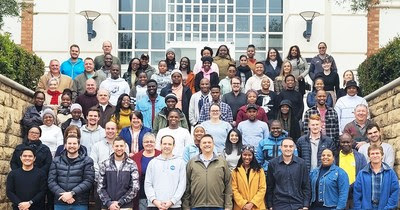oolpert Africa combines the mapping, surveying and data services of Woolpert, Southern Mapping and AAM.
JOHANNESBURG, Sept. 12, 2022 /PRNewswire/ — Woolpert has integrated the staff, resources and local experience of its two geospatial companies in Africa, Southern Mapping Company and AAM, to form Woolpert Africa. The team will provide geospatial data collection, processing and management to support common applications in Africa, including services in mining, power, infrastructure, agriculture and the environment.

Woolpert acquired Southern Mapping Company in 2019. Based in Johannesburg, Southern Mapping, a Woolpert Company, specializes in lidar, hyperspectral imagery and remote sensing technologies. AAM, a Woolpert Company, is a photogrammetric mapping, surveying and GIS firm headquartered in Australia. AAM joined Woolpert in 2021. It has offices in Johannesburg and Cape Town and staff across multiple African countries and the Gulf States.
“Individually, each of our companies have made a name for themselves across Africa by providing cutting-edge geospatial services to address a wide range of needs,” Woolpert Senior Vice President Joseph Seppi said. “Together, we are an industry-leading company that lives and works across the continent and understands doing business in Africa. Together, we are the largest full-service geospatial firm in Africa.”
These companies introduced the first lidar system in Africa and the first hyperspectral system based in South Africa. The Woolpert Africa team has mapped more than 2 million square kilometers of the continent and has worked in more than 45 African countries, completing more than 1,500 projects.
“This alignment of regional resources is in line with our strategic vision to expand technology and innovation to best serve our clients, while giving staff the opportunity to create and advance,” Woolpert CEO Scott Cattran said. “We’re very excited to announce the launch of Woolpert Africa.”
About Woolpert
Woolpert is the premier architecture, engineering, geospatial (AEG) and strategic consulting firm, with a vision to become one of the best companies in the world. We innovate within and across markets to effectively serve public, private and government clients worldwide. Woolpert is an ENR Top 150 Global Design Firm, earned six straight Great Place to Work certifications and nurtures a culture of growth, inclusion, diversity and respect. Founded in 1911 in Dayton, Ohio, Woolpert has been America’s fastest-growing AEG firm since 2015. The firm has 1,900 employees and 60 offices on four continents. woolpert.com.
Media contact: Jill Kelley; 937-531-1258, jill.kelley@woolpert.com
Photo – https://mma.prnewswire.com/
Logo – https://mma.prnewswire.com/
